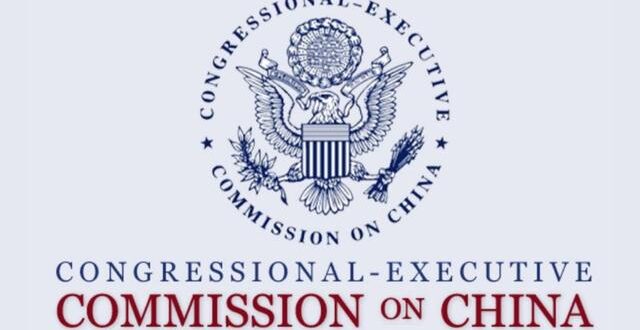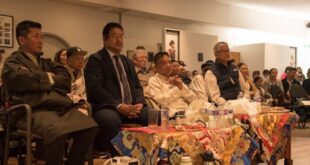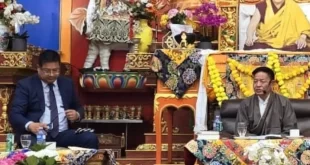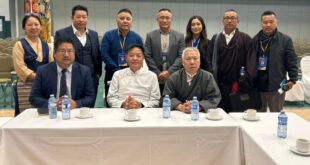Dharamshala: The latest annual report from the Congressional Executive Commission on China (CECC) underscores the persistent severe limitations on international human rights, evidenced by the punishment of Tibetans for exercising their fundamental rights. These include expressing religious beliefs, critiquing PRC policies, and sharing information online. The 2023 annual report, which covers human rights and rule of law developments in the People’s Republic of China (PRC) from 1 July 2022 to 30 June 2023, notes the lack of renewed negotiations between the PRC and His Holiness the Dalai Lama’s representatives since 2010 and the PRC’s interference and attempt to control over the selection and recognition of Tibetan Buddhist reincarnated lamas, including His Holiness the Dalai Lama.
The report outlines the DNA, blood sample, and iris scan collection programs employed by the PRC as forms of social control, surveillance, and repression of Tibetans. It also highlights PRC policies aimed to restrict the use of Tibetan and other regional languages, such as shutting down schools, banning language instruction in anything other than Standard Mandarin, and establishing a network of boarding schools where Tibetan children are forced to enrol.
The report also finds PRC authorities intensifying restrictions on religious activities, particularly around significant events and sensitive dates. Examples include prohibitions on celebrating His Holiness the Dalai Lama’s birthday, increased surveillance during such occasions, and warnings against sharing images of His Holiness. Additionally, individuals have faced detention for unauthorized social media groups celebrating religious figures’ birthdays, warnings against commemorating His Holiness the Dalai lama’s birthdays online, and severe consequences for sending donations abroad, with monks receiving prison sentences for supporting exiled leaders. Tragic incidents, such as deaths in custody and allegations of police torture, further highlight the oppressive environment faced by Tibetans.
The report also delineates the impact of strict “zero COVID” measures following the COVID-19 outbreaks in Tibet, causing criticism and protests due to inadequate support during lockdowns. Authorities censored dissent, detained hundreds, and discriminated against Tibetan detainees. Despite partial relaxation of restrictions, protests continued, especially by Han Chinese migrants seeking to leave Tibet, highlighting ongoing tensions.
The 2023 annual report includes a new chapter titled “Technology-Enhanced Authoritarianism”, acknowledging how emerging technology facilitates surveillance, censorship, and repression of freedoms in China and globally.
Recommendations from the CECC for Members of the U.S. Congress and Administration officials:
Members of the U.S. Congress and Administration officials are encouraged to take the following actions:
- Work with the United Nations to help set up visits by U.N. human rights officials, including the High Commissioner for Human Rights, the Special Rapporteur on minority issues, and the Special Rapporteur on the right to education, to Tibetan areas of China to independently assess the human rights situation there, free of any restrictions or hindrances by Chinese Communist Party or government officials, to be followed by a full report to the United Nations on their findings.
- Adopt and implement appropriate legislation to prohibit American companies doing business with Chinese police and other law enforcement agencies in Tibet from selling or providing equipment used by those forces in gross human rights violations, including mass coercive biometric data-gathering and surveillance programs.
- Work with government officials, parliamentarians, and nongovernmental organizations in like-minded countries to pressure the Chinese government and Communist Party to respect, as a matter of the right to religious freedom and as recognized under Chinese and international law, that it is the right of Tibetan Buddhists to identify and educate all religious teachers, including the Dalai Lama, in a manner consistent with Tibetan Buddhist practices and traditions.
- Urge the Chinese government to cease treating the Dalai Lama as a security threat, and encourage the resumption of genuine dialogue, without preconditions, between the Chinese government and the Dalai Lama or his representatives.
- In interactions with Chinese officials, call for the release of Tibetan political prisoners currently detained or imprisoned for the peaceful exercise of their human rights. The records of detained Tibetans in the Commission’s Political Prisoner Database provide a useful resource for such advocacy. Urge the Chinese government and its law enforcement and security forces to end the use of arbitrary detention, disappearance, beatings, torture, and intimidation to suppress and punish Tibetans for the peaceful exercise of their rights.
- Urge the Chinese government to invite representatives of governments and international organizations to meet with Gedun Choekyi Nyima, whom the Dalai Lama recognized as the 11th Panchen Lama, and his parents, all three of whom disappeared shortly after his recognition as Panchen Lama in 1995.




